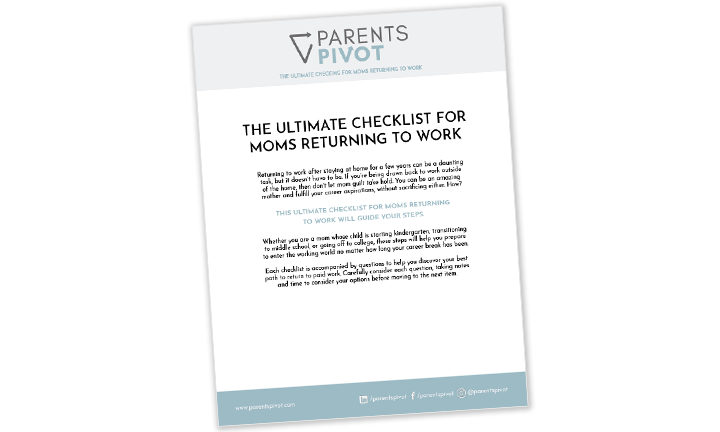A few months ago, we interviewed a recruiter named Brenda who hired a stay at home mom (Debbie B.) to work in her recruiting firm. I hope that you enjoyed reading about all of the benefits that Brenda J. experienced hiring Debbie B.! In case you missed any of those articles, you can find them starting with Part 1 on the Parents Pivot website here. Now that we have heard Brenda’s experience I thought that you all might like to hear from Debbie too! The interview has been edited to be concise.
Anna: I really appreciate you doing this interview with me. It was so insightful to get Brenda’s perspective on hiring a stay at home parent returning to paid work. She had wonderful things to say about you. I’m glad to have the opportunity to interview you and get the full picture.
I love to hear from people who have gone back to work about skills they honed as parents that they use at the workplace. What was a skill that you used as a parent that helped you as a recruiter?
Debbie: I was heavily involved in my children’s extracurricular activities, the PTA, taught children's choir for years, and we were very active in our church. I was used to being around and dealing with a lot of different types of people. I had many friends who were all in different stages of life. This social comfort helped me in my recruiting job where I was just as comfortable talking to the CEO as I was talking to anyone else in the company.
My job was to take candidates through the interview and application process. It wasn't difficult for me to learn how to do that because I was curious and interested in people. I was great at assessing people’s skill sets and matching them with appropriate jobs within companies. I believe that much of the job description is not in the job itself but in the person. Yes, you have to have the skills that the job requires, but I learned early on that an individual’s personality is so important. Some jobs require a reserved, diligent worker while others need a person who is able to interact with customers and other employees. I was the latter and just loved being a recruiter!
As far as the actual job description of meeting with companies and learning how to work with them, Brenda would come once a week and I would go out on call with her. I learned a lot from just watching and listening.
Anna: Having that experience in shadowing Brenda and seeing what she called “a day in the life” of a recruiter and then using all those people skills that you practiced throughout your life as a mom sound like it benefitted you in your work as a recruiter. What a great alignment of your experience with skills required for your job! For someone who's returning to work, what do you think is helpful in the on-boarding process?
Debbie: My was mantra: I can do it! When I went back to work, my kids were in high school and I was ready for the next phase of my life. I was excited. I was open to it. It seemed like a different world, but I found that once I was trained and I was on my own, I loved it.
Think about your personality and find the right job for you. Recruiting was the job for me. You have to love working with people and I do. When I interviewed people re-entering the workforce, I could share with them that I understood their fears — we came from the same place; they were not alone. I could put them at ease and encourage them. I wanted them to leave the interview saying Debbie’s excited to help me get a job.
There's a job for everyone, but not everyone's for a job. You have to find your niche and understand what you are looking for in a company, its job and its culture.
Anna: What is important for stay at home parents returning to work to share in an interview? What would you not share?
Debbie: A good interviewer asks the questions that are pertinent to the job so it depends on what type of position you're interviewing for. There are many personal questions interviewers can't ask any longer. As an applicant, I would just be ready to answer the questions: What do you want to do? What do you enjoy doing? It's okay to say what you do not enjoy doing. Also, have your own questions ready for the company.
If you look through a job description and see that it requires a degree that you don't have, then don’t apply for that job. But it’s okay to let your recruiter know that you are interested in the position and those job responsibilities in case another similar job comes up that doesn’t require a degree. Everybody is looking for people. We never have enough people. If I interviewed someone for a particular position and they were not suitable, believe me, if we could use them in another area, we absolutely would.
It’s okay to say: Do you have anything else you think I'd be a fit for? Because that shows that you’re interested, open, and really want to go to work.
Anna: That’s a great idea. Clearly stating that you like the company culture or mission and, while this job may not fit best, describing what you might be a good fit for. Saying I have these skills and I like to do this and then asking if they know of any positions like that available within their company or another.
Debbie: Yes. We never presented a resume to a client until we interviewed the candidate. It’s our reputation on the line. That’s why we do assess people on things like computer skills.
One more thing for people re-entering: Be professional. Dress professional. It is a different atmosphere today but you still want to look sharp.
Be confident. You are going to make mistakes early on, but just look ahead and come up with some solutions. Don't be scared. If you have good people skills and you’re honest and upfront, (and use proper grammar!), then that will go a long way.
Anna: What were some of the fears that you had about returning to work?
Debbie: My biggest concern was around my computer skills. I’d worked in an office setting for about 5 years prior to having a family. I knew that I could do it again, but so much had changed since then, especially with technology. I had had a lot of people interaction but computer skills were the tough part.
I had a call from another agency. They asked me to work in their offices on a project for 6-7 weeks. I started getting up to speed on their systems and technology. Starting out on a temporary basis was a great way for me to re-enter the workforce.
Anna: It’s great to know what your blind spots are and find a way to develop those through volunteering or getting a part time job or project work. The parents that I talk to often have other concerns too. They say: “What about my family that is used to having me at home and doing everything? How do I manage that transition?” Do you have any advice for people with questions like that?
Debbie: My kids were older when I returned. The challenge that I had was that my oldest didn't have a driver's license yet, so it was helpful to carpool with other families. There are going to be emergencies and you just have to have a back-up plan.
My youngest daughter is a school teacher. When she had her first child, she had to go back to work the last 6 weeks of school after maternity leave. She had a bad experience with the daycare and ended up asking me to babysit until the summer. It's tough when you don’t have a lot of flexibility. So #1, parents really need to hash out childcare options for emergencies.
The recruiting company that we worked for was a small company and we didn’t have a lot of flexibility. It made me really nervous. We couldn’t work from home at that time. But now, many companies offer remote work options. When you're interviewing, you need to know about flexibility. You don't want to just ask, how many sick days do I have. But you have to get a sense of what a company will allow. Also, come up with a backup plan for how you will manage and suggest workable alternatives.
My daughters both work now. They are great moms. Megan works with children who struggle with math and science. It’s tough but that's her calling. She still makes time for date nights with her husband and for her girlfriends from college. It’s important to still do all of those things. I think that's what's hard for some women. They think that it’s not going to happen but it does. You make time for it.
Anna: Thank you so much. I know this article is going to be helpful for so many parents thinking of returning to work. Thank you so much for taking the time to share your perspective!










